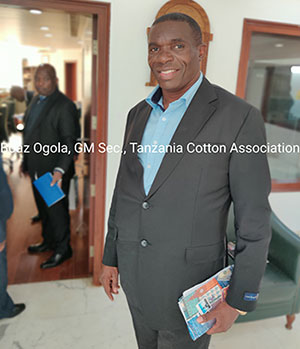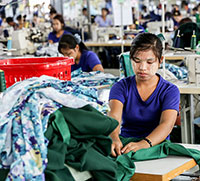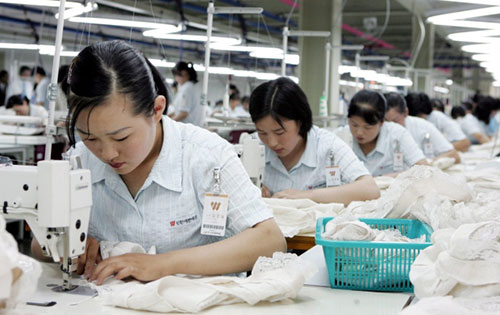FW
"Involved in buying raw cotton from the country and exporting ginned cotton to countries like India, Bangladesh, China and Indonesia, Tanzania Cotton Association has so far produced 600,000 bales of ginned cotton. The association has now set its sights on the Indian market. Boaz Ogola, General Secretary of the association elaborates on its operations and future plans."

This year, Tanzania Cotton Association (TCA) produced 600,000 bales of ginned cotton. This group of 45 cotton stakeholders is involved in buying cotton, cleaning it and exporting this ginned cotton to the above mentioned countries through its agents. “Our main job involves cotton ginning,” says Boaz Ogola, General Secretary. “For this, we form a public-private partnership with our government and the private sector,” he adds.
TCA also works with research centers, and import and export agencies. “Around 75 per cent of the cotton produced by us is exported. The rest is consumed by the domestic industry,” expounds Ogola further.
The textile industry of Tanzania covers the spinning, knitting, weaving and fabrics segments. The country grows most of its cotton organically. Since this cotton is handpicked, it is not contaminated. “About 60 percent of this cotton is roller ginned which helps us to maintain its fiber length and strength,” adds Ogola.
TCA also adheres to strict working conditions. Its ginning facilities are free of forced and child labor. “Our companies have been certified by Cotton Made in Africa, and we now aim for the Best Cotton Initiative (BCI) certificate,” notes Ogola.
The organic cotton produced by TCA is also exported to countries like Switzerland and Turkey. The country now sets its sights on the Indian market. “Investments from India would add value to our operations. We can create new jobs and offer better prices to our farmers,” avers Ogola.
Though Tanzania’s official currency is the shilling, TCA uses the dollar for its exports. “We have a politically stable environment which helps us to move towards an industrialised economy. It also helps our government to attract investments from the global textile leaders,” alludes Ogola.
Making plus size clothing is more complicated than extending sizes. More than 60 per cent women in the United States are a size 14 and up, but they continue to be underserved. Women are having a hard time identifying their own body shape, which informs how they shop. Women often misidentify their body shape. They may consider themselves to be hourglass-shaped when they are not and are actually pear-shaped. This discrepancy happens because of the way brands market and sell their clothing.
For many retailers, extended sizing means simply making straight-sized garments in larger sizes, a process that neglects the fact that women have different sizes and shapes. Of the 62,000 specialty stores in the US, only 2,000 of them focus on plus size women.
Plus size clothing sales represent around 17.5 per cent of all women’s clothing sales in the US. Plus size fashion is here to stay and has already conquered the hearts and budgets of many in the apparel industry. Spending on this niche is on the rise and so are the opportunities for retailers wanting to tap into the $46 billion opportunity. E-commerce contributes to the growth of plus size fashion primarily because of ease of access, size availability and convenience that it provides.
The Indian cotton spinning industry’s performance has been severely constrained in the current fiscal. Both revenues and operating profits of domestic spinners are likely to drop. Reasons include a demand slowdown, unfavorable raw material prices and rising funding requirements. While export volumes have seen some uptick in recent months, they remain lower than the levels seen in the preceding fiscal.
Significantly, the credit profile of spinners has weakened in recent quarters, with earnings from operations and liquidity position facing pressures in the first half of fiscal 2020, amid rising debt levels. The scenario is quite similar to fiscal 2012, when cotton prices fell sharply, resulting in high inventory losses and tight cash flows for spinners. The impact on debt-coverage metrics and liquidity is expected to be more adverse for leveraged companies that have undertaken a sizeable debt-funded capital expansion in recent years and have higher repayments scheduled.
So, spinners expect that the overall fiscal ’20 performance will be weighed down by the tepid volumes and weak earnings seen so far. A revenue de-growth of around six per cent is expected for spinners due to weak export demand amid increasing competition from other countries and sluggishness in domestic consumption levels.
Mehdi Benabadji is the new CEO of Brioni, the Italian luxury menswear couture house a part of the French luxury group Kering. Benabadji joins Brioni with a wealth of experience. Since 2003, he has held a series of operational and executive positions within Kering. Most recently, he was chief operations officer, in charge of the group’s logistics and industrial activities. Benabadji began his career as a consultant in 1995, before joining Kering eight years later. He was previously director of strategy and development of the house after its acquisition by Kering in 2011. His mission now will be to consolidate the repositioning of Brioni and to support its international development.
Brioni was founded in 1945. All products are made in Italy and meticulously handcrafted by expert artisans. The house is revered for its personalised bespoke approach. Its product range comprises all categories of men’s apparel and accessories, including shoes, leather goods, jewelry, eyewear and fragrances. Brioni has the potential to redefine its position as a unique luxury brand. The house’s philosophy is based on a pioneering approach to menswear. Suits of this high-end Italian brand retail in the thousands of euros. The brand has a distinct identity, and is known for its sartorial values and pioneering heritage.
Australian women like to take fashion risks. They buy a lot of organza, colors and cut-outs. Tailoring has become fashion, not just work wear. And they love linen. Linen's popularity also reflects customers’ growing interest in sustainable fashion and people are willing to pay more for it. And they are going online in a big way. Consumers are developing more confidence to buy categories they would have previously shopped at a physical store, such as swimwear and denim.
Australia is a nation of T-shirt-and-jeans-loving shoppers, says online retailer The Iconic just released year in fashion report, which tallies the top sellers for the year, as well as breaking it down into various categories, including sportswear, gender and clothing with sustainable credentials.. And they are obsessed with sneakers. Popular footwear brands are Vans, Converse and Tirkenstock. The country’s female shoppers are becoming more comfortable with purchasing bigger ticket items online. Men love heritage brands including Nike, Tommy Hilfiger, Ray-Ban and Polo Ralph Lauren. The hottest brand of 2019 was Bottega Veneta. Other major trends of the decade include slogan tees, ugly sneakers and natural brows.
Australian brands are turning against animal cruelty. Robust fashion policies are being aimed at reducing animal welfare risk and improving supply chain transparency. Brands want to be seen as opting to use only fabrics or textiles which do not allow for cruel animal practices or treatment while also striving for positive environmental and human welfare attributes.
Jacket Required, the UK’s only contemporary menswear and streetwear trade exhibition taking place at the Old Truman Brewery on the 22nd – 23rd January 2020, gets a facelift for the AW20 show with a re-edit focusing on new, premium, and sustainable menswear, an updated layout containing a skate ramp installation, and new premium show build.
The new layout aims to attract buyers with a streamlined edit of new brands to the show including Snowman New York, Hedon, Bjanko Milano, On Running, and Alexridolfi, alongside leading labels Aigle, Pantherella, R.M.Williams, Suit Denmark, Fjallraven, Didriksons, Cheaney Shoes, Blundstone, SECRID, LOIS Jeans, TOMS, Kangol, and many more.
Generating an experiential buzz, the installation of a Santa Cruz Skate Ramp will be entertaining live demonstrations from their skilled skate team. Santa Cruz will also be presenting its AW20 collection alongside streetwear brands Arbor, Powell Peralta, Straye Footwear, Body Glove, IMPALA and R8GZ. Sustainability continues to be a key focus for the show and will showcase the debut collection from new label Universal Change Makers (UCM).
Adam Gough, Event Director of Jacket Required quotes “The AW20 show will differentiate itself with a high quality streamlined premium, streetwear, and sustainability offering of brands. The show build is shifting to premium full height white walling, and the revamped layout has been designed to present visitors with an inspiring and stimulating buying environment. The Santa Cruz skate ramp installation and live DJ’s aim to elevate the whole Jacket Required experience.”
"The garment industry in Myanmar has grown significantly in the past five years, from an export value of $900 million in 2012 to $4.37 billion in the first 11 months of FY 2018-19. The country now aims to reach an export value of $10 billion garments by 2024 besides creating over a million jobs for its unskilled and semi-skilled workers."
 The garment industry in Myanmar has grown significantly in the past five years, from an export value of $900 million in 2012 to $4.37 billion in the first 11 months of FY 2018-19. The country now aims to reach an export value of $10 billion garments by 2024 besides creating over a million jobs for its unskilled and semi-skilled workers.
The garment industry in Myanmar has grown significantly in the past five years, from an export value of $900 million in 2012 to $4.37 billion in the first 11 months of FY 2018-19. The country now aims to reach an export value of $10 billion garments by 2024 besides creating over a million jobs for its unskilled and semi-skilled workers.
After 2015, Myanmar’s garment exports have grown by almost $1 billion every year. This growth has been possible mainly due to the investments made by China and Vietnam in the country. Of late, both Chinese and Vietnam investors have been setting up factories in Myanmar. These countries produce their goods in Myanmar and send them to the EU which offers zero duty benefits on imports from Myanmar under its everything but Arms scheme in 2013.
Cheap labor, zero duty benefit boost attractiveness
One reason why these countries prefer setting up production units in Myanmar is because it is not only closer to China but is also cheaper in terms of labor comparatively. Besides, the country offers zero duty benefit on export of goods to European Union. Myanmar has a lot of seaports from where goods can be shipped easily at cheaper rates anywhere in the world.
China but is also cheaper in terms of labor comparatively. Besides, the country offers zero duty benefit on export of goods to European Union. Myanmar has a lot of seaports from where goods can be shipped easily at cheaper rates anywhere in the world.
As logistics and transportation costs are cheaper in Myanmar, the country has been developing a lot of industrial zones and facilitating foreign investors off late. Currently, it produces only basic garments as manufacturers neither have a skilled workforce nor sophisticated machinery to cater to high-end-value-added garment items.
The garment factories in the country have also been receiving work orders of basic items diverted from China and Bangladesh. One reason for order diversion from Bangladesh is that all micro, small and medium factories in this country have either closed down or cannot take orders because of little or no profit. Large and medium-large factories are less interested to cater to basic work orders. As a result, these work orders are shifting to Myanmar.
New MSME policy for smooth manufacturing
Meanwhile as the number of garment factories in Myanmar increased last year, export volumes also increased as well. As per SMART Myanmar, Europe is the most important market for Myanmar-made garments. European countries like Germany, which accounted for $519 million worth of exports in 2017 and the United Kingdom, which bought garments worth $213 million in the same year, are the hot favorites for Myanmar exports.
Over 1.1 million workers are currently employed in garment, textile, footwear and accessories factories across Myanmar. And tens of thousands indirectly work in the industry through logistics and transport services. C&A Foundation estimates by 2020, the sector is likely to employ 1.5 million people. SMART Myanmar, a project funded by the European Union, recorded 19 factories registered so far for either garment or footwear production.
Levi Strauss has been named one of the winners of Engage for Good’s Golden Halo Awards. This award is given for outstanding achievements in corporate social impact. Denim giant Levi Strauss was recognised for its history of committing to equality and sustainability, from integrating US factories before the Civil Rights Act, to aggressively adopting water-saving and climate-conscious production techniques. The company believes in the values of empathy, originality, integrity, and courage.
Golden Halo is given to organisations which unite and engage consumers and employees around initiatives that make a purposeful impact.
Meanwhile Fashion brand Save the Duck has won Peta’s Company of the Year award. Save the Duck won the award for its commitment to respecting and protecting animals, using raw and recycled materials, and continually innovating its practices to meet the planet’s needs. All its products are animal and cruelty free. Not only has Save the Duck always been free of down, fur, and all other animal-derived materials, it also continues to push the boundary of what it means to be a sustainable company, constantly changing its product line to be more and more environmentally friendly. In addition, Save the Duck uses recycled plastic bottles, regenerated fishing nets and animal-free eco-fur in its designs.
British footwear company Clarks has announced a new restructuring plan for next year. According to this plan, the company plans to lay off 170 of its employees in the New Year. It currently has a labor force of 13,000 employees.
Clarks is led by Giorgio Presca, former Levi’s, Diesel and Geox executive who replaced Mike Shearwood, after his departure last March. In November of this year, the company appointed Philip de Klerk, former chief executive officer of Low & Bonar, as the new chief financial officer to face its restructuring.
These cuts come after the company reached losses of 82.9 million pounds at the end of 2018. Its group sales, on the other hand, fell by 4.6 per cent, to 1.5 billion pounds compared to 1.5 billion pounds, year-on-year.
The company, founded in 1825 by brothers James and Cyrus Clarks, has 750 stores worldwide. Currently, the Clark family continues to be the majority shareholder of the company with 84 percent of the shares.
The Union government has announced a ‘Scheme for Assistance to Strengthen Specific Sectors in the Textile Value Chain’ effective from September 4, 2018, to December 31, 2023. As against the policy that attracted fresh investments in ginning, spinning and garmenting, the assistance scheme covers segments such as weaving, knitting, dyeing/printing, machine carpeting, technical textile, composite units and other activities in the such as embroidery, winding, sizing, twisting and crimping.
The scheme provides financial assistance through credit-linked interest subsidy of six per cent for micro small and medium enterprises (MSMEs) and 4-6 per cent for large enterprises, with an upper ceiling of Rs 20 crore per annum. Further, the scheme offers subsidy in power tariff of up to Rs 3 per unit for weaving, and Rs 2 per unit for other eligible segments with a validity of five years.
The assistance scheme is meant for new units being set up. These newer units would be more cost-effective, and compete with us on price difference. Already, the existing textile industry in Gujarat is struggling due to multiple reasons. Around 30 textile processing units have been shut in recent months, with the remaining 320 odd units functioning at only 70 per cent of the original capacity. Surat, the biggest textile market in the state, alone has seen daily production fall from 40 million metre per day to 25 million metre per day.
Based on the subsidy under the new scheme, newer units could carry a 15-20 per cent production cost advantage over the existing ones. Apparently, the scheme also offers assistance covering all existing units which are compliant with the government’s energy, water and environment conservation norms, and have been in operation for more than three years.
The scheme provides 20 per cent assistance on the cost of with a ceiling of Rs 30 lakh, and 50 per cent assistance for audit fees with a limit of Rs 1 lakh. The benefits can be availed once in two years during the operative period of the scheme. A one-time financial assistance of up to 50 per cent of cost, with a limit of Rs 25 lakh, is provided for and modernization. The scheme provides assistance of up to 25 per cent of capital expenditure on common facilities and infrastructure, with a limit of Rs 15 crore for setting up textile parks.












